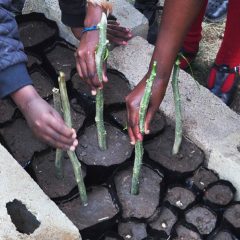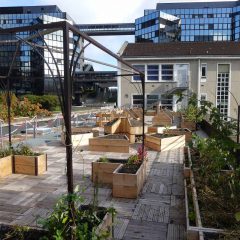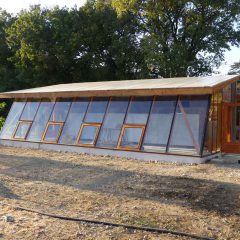Lesotho is a small mountainous country enclosed in South Africa.
Altitude, lack of water, and poverty of soils often laden with stones, do not favor agriculture, and it is mainly livestock that predominates.
Projects developed in this country must therefore take account of these particular constraints.
Permaculture, cropping associations, are ways to cultivate more intensively on small fertile areas identified by the villagers.
Agroforestry is a key element in the development of these fertile plots of market gardening as well, since it takes into account the need for biomass to enrich soils.
Leaves and branches produced by trees will bring compost resources that can be used to create and enrich new culture beds over time.
Agroforestry also includes in its approach the creation of lively hedges made of shrubs with thorns that protect the plots against the animals in wandering.
Projects presented by Transjardins in Lesotho.
Designing Hope has brought its expertise in Lesotho in a project funded by The Ivory Foundation and managed by the NGO Sentebale.
This project is located in St Paul School, in Leribe, at the northern end of Lesotho. It brings together children from 5 to 14 years old, deaf and dumb from rural areas and from very disadvantaged backgrounds.
Saint Paul’s School offers these children the chance to get out of their isolation by teaching them sign language and offering them an education and a quality living environment in a boarding for several years. At the end of their schooling, the children return to their home villages and are being followed by the school for a professional integration.
The Ivory Foundation has set up an agricultural project on the school premises.
A demonstration garden was put in place, with plots cultivated by the children.
The children can gain skills that can be valuable when they return to their respective villages.
The aim is also to gain self-production for the school canteen, farm animals (chickens, cows, pigs) are also raised on the school grounds and looked after by the older studients with the support of a farm manager.
A comic explaining the principles of permaculture has also been designed for the pupils of St Paul’s School.
The Ladysmith group supported by Designing Hope has traveled to Lesotho to train the children to permaculture methods. Currently, a new project combines the two projects with the design of a cookbook inspired by traditional recipes using vegetables that can be grown locally.
In 2017, a demonstration garden of agroforestry techniques is also being developed in the outskirts of Maseru.

Click bellow to follow the publications of this project:







